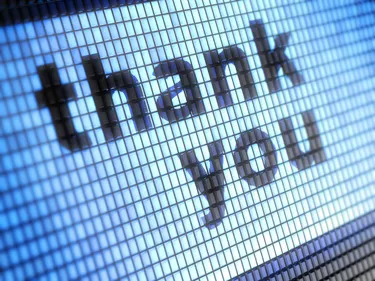
A 2017 survey of hiring managers indicated that 22 percent of them look less favorably upon job applicants who don't follow up with a thank you note – and that was before the COVID pandemic skewed the hiring process. Yet not many job seekers take the time to do so, according to Monster.com, so that short and sweet email can immediately set you apart from other candidates and bring your job search to a successful conclusion.
1. Showcase Your Written Communication Skills
Video of the Day
Some jobs require more in the way of written communication skills than others. An email can highlight your gift for the written word if you're interviewing for one of them. It's a sample of your writing ability.
Video of the Day
That said, don't be chatty. Take care to keep it professional. Your email should carry the same tone you would use to communicate with a customer or client. Avoid humor, and open and use a new email account if your current email address is something casual and/or goofy. Proofread it, then proofread it again (and maybe a third time) to catch any and all spelling or grammar errors. You might ask a friend to read it over for you with a cold eye, too. Above all, make sure you've spelled the interviewer's name and the company name correctly.
2. Add Important Forgotten or Overlooked Information
It's a rare individual who's never left a job interview only to smack themselves on the forehead when they realize that they forgot to mention something important. Your thank you email gives you a chance to get that overlooked point across. You can impart additional information. It can also clarify something that you think you might not have explained clearly enough.
Consider also: Interview Questions You Should Expect
3. It’s a Professional Courtesy
Sending a thank you email always shows good manners, whether you're following up on a job interview or a social invitation. Yet it's frequently overlooked in this day and age. Your email will demonstrate that you're courteous and respectful and leave your interviewer with a good impression of you. It will also show that you have a proven ability to follow up with things and not leave them dangling, and this can be a valuable job skill.
4. You Were Paying Attention
Use your email to mention something specific about your meeting. This serves two purposes. It will demonstrate to the hiring manager that you were paying attention, and it can remind them of any pleasant exchange you shared or a trait, talent or ability that they seemed interested in. It will help them remember you in a sea of others.
Consider also: The Key to Finding a New Job: Authenticity
Email or Snail Mail?
There's an ongoing debate as to whether an email note is sufficient, or if you should go to the old-fashioned bother of printing out a thank you letter, folding it into an envelope and finding a stamp and a mailbox. The good news is that surveys have indicated that most hiring personnel – 87 to 89 percent – seem to be perfectly OK with receiving an email over a paper or handwritten note.
But, of course, an email is time-efficient and easy, and one of your goals here is to demonstrate that you're willing to go the extra mile. You might consider doing both. Send a quick email message, then follow up on paper.
Don't confuse email with other electronic approaches, such as sending a note to the company's social media site. That's public. Keep it private and personal.
For the Most Positive Effect
Most of the same rules for paper notes apply to email thanks. Keep it short, sweet and to the point. It shouldn't be any longer than a paragraph or two. You can find numerous email templates and letter examples online to guide you. Send it promptly, ideally within a few hours of your interview or at least within 24 hours. But don't do it immediately, and do not send it from work if you're already employed elsewhere and you're looking for a new job.
You might want to send emails to each individual if you were interviewed by more than one person with the company, or if a recruiter helped you to land the job interview. Just make sure that the separate notes aren't verbatim carbon copies of each other. Personalize each in some small way.
- Job-Hunt.org: How to Write a Thank You Letter After an Interview (Examples)
- Job-Hunt.org: How to Write a Successful Thank You Email After an Interview
- Astrix: The Importance of Sending a Thank-You After a Job Interview
- Monster: The Benefits of a Thank-You Letter After an Interview
- SHRM: No Thank-You Note? No Job